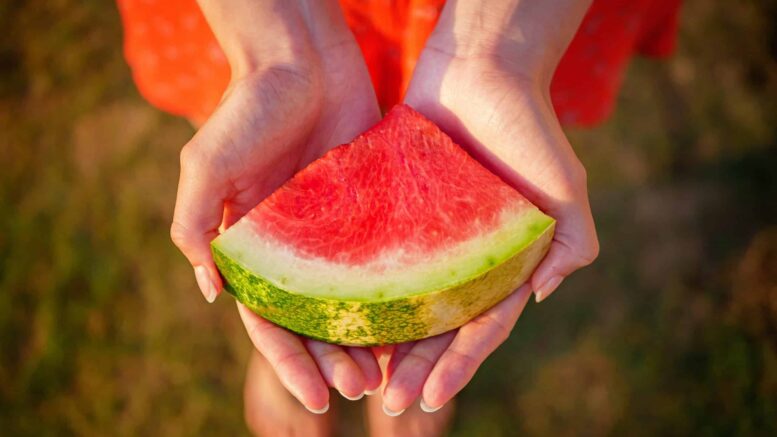Is watermelon good for arthritis? Does it Help?
Arthritis – inflammation of joints, is a common condition affecting all age groups.
The feeling of stiffness, pain, immobility in joints, without a doubt can significantly affect your quality of life.
Inflammation of joints can be acute – caused by infection, trauma, and the flare of chronic disease. And chronic – is associated with rheumatoid arthritis, SLE – systemic lupus erythematosus, Osteoarthritis, Psoriatic arthritis, Gout, and the list goes on.
There is no definite cure for those conditions, but treatments such as surgery, medications, and physical therapy can help relieve many of its symptoms. You can also supplement your treatment by making changes to your diet.
Foods that reduce the process of inflammation can help alleviate the symptoms caused by arthritis.
So having a healthy diet and following a relatively active lifestyle can markedly do you a favor with your complaints and even help you prevent some of the complications of chronic arthritis.
Can watermelon alleviate arthritis symptoms?
You might be surprised to find out that quite a lot of anti-inflammatory and pain-relieving properties are hidden behind this refreshing summer fruit. Since it’s rich in various antioxidants, Vitamins, and minerals.
Let’s list all the nutrients of watermelon that can benefit arthritis
We start with – Antioxidants
Arthritis is mainly caused by inflammation and oxidative stress, the perfect remedy for those processes is antioxidants. Watermelon is exceptionally rich!
Beta carotene
Beta carotene is an organic red-orange pigment mostly found in fruits and vegetables, human body converts it into Vitamin A which has powerful antioxidant effects.
Watermelon is especially ample with Beta carotene. Since There are Approximately 400 micrograms of this antioxidant per 100 grams of watermelon.
How does beta carotene impact arthritis symptoms?
Several trials are demonstrating its beneficial effect on people with chronic arthritis.
According to one case-control study, where serum concentrations of Beta carotene, retinol(Form of Vitamin A), and alpha-tocopherol were measured in people with chronic arthritis and compared to controls (people without the disease) – patients suffering from Rheumatoid arthritis and SLE had significantly lower serum levels of these antioxidants.
This proves our point and concludes that:
“Low antioxidant status is a risk factor for rheumatoid arthritis and SLE”
Besides that, another research has highlighted the value of beta carotene for the management of gout arthritis, summarizing:
“Our findings suggest that pharmacological application of β-carotene might improve inflammatory symptoms related to the NLRP3 inflammasome, such as those experienced by patients with gout”
And by the way, the riper watermelon is more beta carotene content than it has, so make sure to choose the right one!
Lycopene
It’s the nutrient that gives watermelon its red color.
Another important antioxidant is also known to alleviate oxidative stress and relieve the degree of inflammation.
Moreover, there is a study supporting idea of lycopene having beneficial effects on long-term prognosis in patients suffering from Rheumatoid Arthritis
It’s even confirmed by Pubmed research that watermelon is the richest source of these two powerful antioxidants, “Consumption of watermelon juice increases plasma concentrations of lycopene and beta-carotene in humans”
Vitamin C
When you think of the richest sources of this vitamin C you probably think of citrus fruits like oranges and grapefruit and so on, which is correct, but watermelon also has quite a content of this vitamin – 8,1mg per 100 grams of watermelon.
You might have already heard about countless incredible properties and benefits of vitamin C for our health. It is especially crucial for our connective tissues – hence the skeletal system.
But did you know that it also has proven analgesic (pain-relieving) properties? Here are the results of a 2017 study by the Journal of Translation Medicine:
‘’ Accumulating evidence indicates that vitamin C can exhibit analgesic properties in some clinical conditions, thus potentially mitigating suffering and improving patient quality of life. ‘’
Since patients suffering from arthritis very often have discomforting pain, this property of vitamin C can do them a favor.
Magnesium
Magnesium is a powerful mineral, it acts positively on almost all organ systems: Cardiovascular, Nervous, Digestive as well as musculoskeletal systems.
As a 2020 Pubmed study states, magnesium can also have great pain-relieving properties and can even have a part in future prophylaxis or therapy of arthritis.
“Magnesium can improve the course of some disease conditions such as osteoarthritis, neurological disorders, and cardiovascular disease [ leading to improved analgesia.
It is conceivable that this role of magnesium is much more important than improved analgesia because magnesium can be helpful for disease prophylaxis and treatment.”
Watermelon can aid you in weigh-loss
The more you weigh more load is on joints, hence symptoms are worse.
Besides that, Osteoarthritis, unlike other arthritis we mentioned, is not inflammatory, rather it’s a degenerative “wear and tear” damage to articular cartilage, associated with too much pressure on joints.
One of the main risk factors for osteoarthritis is – obesity. It makes sense that the mainstay of first-line treatment for osteoarthritis is losing excess weight, which increases the load on joints.
Watermelon is a diet-friendly fruit, being only 30 calories per 100 grams and consisting mainly of water – 93% of watermelon is water which makes widely used for hydration and weight management.
To sum up
Watermelon is soaked with antioxidants and vitamins that can alleviate the inflammation process in arthritis and it can also help patients hydrate and lose weight to reduce the load on joints.
Remember to consult with a physician before making any significant dietary changes.
References
https://pubmed.ncbi.nlm.nih.gov/
https://www.arthritis.org/health-wellness/
https://www.ncbi.nlm.nih.gov/pmc/articles/
https://www.ncbi.nlm.nih.gov/pmc/articles/
https://www.nature.com/articles/
https://pubmed.ncbi.nlm.nih.gov/
See Also
Is Watermelon Good for Constipation?

As a nutritionist, I research, find and experiment with recipes, natural diets and meal plans for weight loss, bodybuilding, and detoxing.
